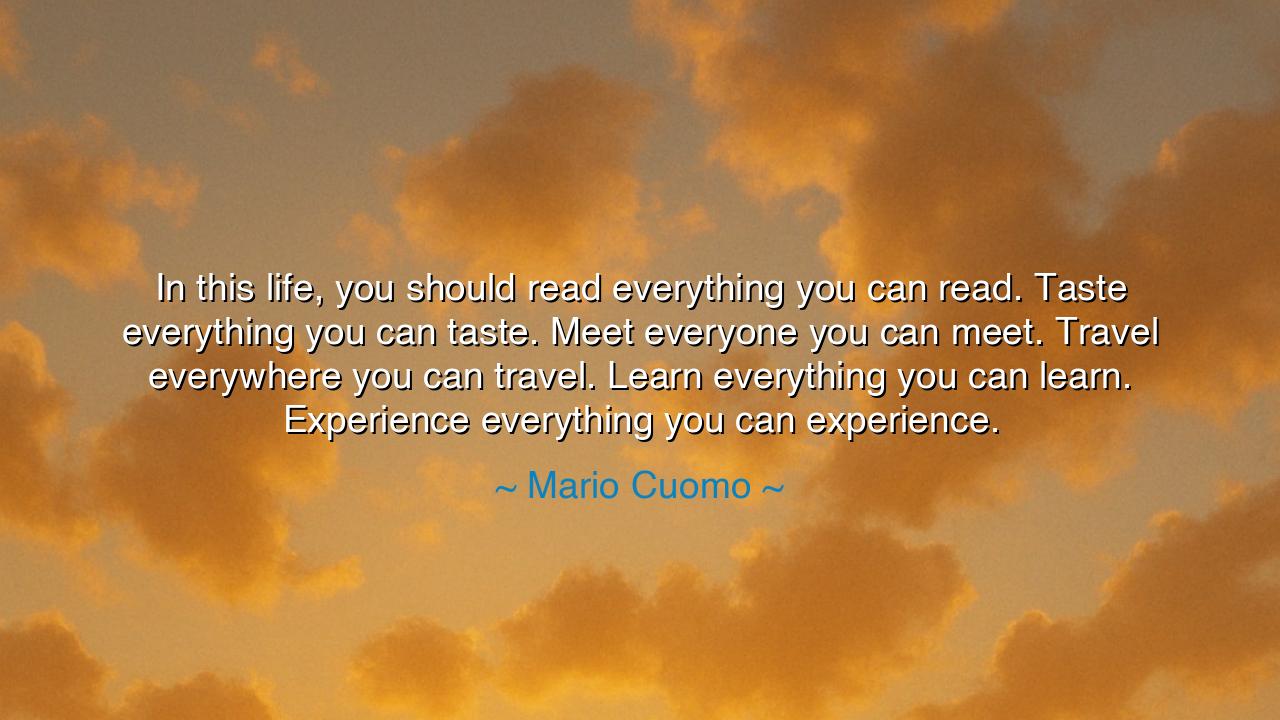
In this life, you should read everything you can read. Taste
In this life, you should read everything you can read. Taste everything you can taste. Meet everyone you can meet. Travel everywhere you can travel. Learn everything you can learn. Experience everything you can experience.






In the words of Mario Cuomo: “In this life, you should read everything you can read. Taste everything you can taste. Meet everyone you can meet. Travel everywhere you can travel. Learn everything you can learn. Experience everything you can experience.” These words are not casual advice but a manifesto of living, a hymn to the fullness of human existence. They call us not to pass through life as shadows, but to drink deeply of the cup offered to us, to open ourselves to the boundless gifts of the world. In them resounds the ancient command: be alive, wholly and without hesitation.
To read everything you can read is to feed the mind with the wisdom of ages. Books are the voices of the dead, the whispers of distant lands, the teachings of sages and poets. Each page is a journey, each word a key that unlocks the world’s mysteries. The Greeks revered the library as a temple; the Egyptians filled papyrus with the secrets of their gods. In this counsel lies the same truth: to refuse reading is to live half-blind, but to embrace it is to open the windows of the soul.
To taste everything you can taste is to honor the body as much as the mind. Food is not only sustenance but story—rice born of Asia’s fields, bread from the Mediterranean sun, spices carried by ancient caravans across deserts and seas. In tasting, we honor the cultures that shaped these gifts, and in sharing meals, we bind ourselves to others. The ancients knew this too: the breaking of bread was a sacred ritual, for to eat together was to weave a covenant of trust and kinship.
To meet everyone you can meet is to embrace the infinite diversity of humankind. Every person is a library of experience, a vessel of memory and hope. By meeting others, whether friend or stranger, we multiply our own lives through theirs. Think of Alexander the Great, who, though he conquered nations, also sought to know their philosophers, their healers, their traditions. He was not great only for his armies, but for his recognition that the world is too vast for one culture alone to contain its truth.
To travel everywhere you can travel is to set your spirit in motion. The earth is a scroll written in mountains and rivers, deserts and seas. To walk upon it is to read its scripture. Pilgrims have known this for centuries: the journey is not only about reaching a place, but about transformation along the way. From the wandering Israelites in the desert to the Hajj to Mecca, from the Silk Road to the Camino de Santiago, travel has always been a path of revelation. Cuomo’s words remind us that the world is wide, and to see it is to see ourselves anew.
To learn everything you can learn is to refuse stagnation. Learning is not confined to schools—it lives in every craft, every mistake, every question asked with humility. Leonardo da Vinci learned endlessly: anatomy, painting, mechanics, the flight of birds, the flow of water. His genius was not in one mastery but in his refusal to limit his hunger. So too must we, for the mind that ceases to learn begins already to die.
And finally, to experience everything you can experience is to accept that life is not measured in years but in depth. Experience is the fire that tempers the soul—joy, sorrow, love, loss, triumph, failure. To avoid experience is to avoid growth; to embrace it is to become fully human. The ancients told of Gilgamesh, who sought immortality but found instead that the true gift was experience itself: the friendships, the journeys, the struggles that shaped his spirit. Cuomo echoes this wisdom—immortality is not in endless life, but in a life lived fully.
The lesson is clear: do not live narrowly. Do not pass through your days as if life were an obligation. Read, taste, meet, travel, learn, experience. These are not luxuries but duties of the soul. In practice, this means saying yes more often—to the book that challenges you, to the food you have never tried, to the stranger whose story you have not heard, to the journey that lies just beyond your comfort, to the lesson that humbles you, and to the experience that frightens you. For only by embracing the whole of life can you say, at the end of your days, that you truly lived.
Thus Cuomo’s words stand as a beacon: life is vast, and so must you be. To shrink from its offerings is to betray the gift of existence; to embrace them is to honor the gods, the ancestors, and the destiny of being human. Drink deeply, then, of every cup life sets before you, for only in doing so will you discover the fullness of who you are.






AAdministratorAdministrator
Welcome, honored guests. Please leave a comment, we will respond soon